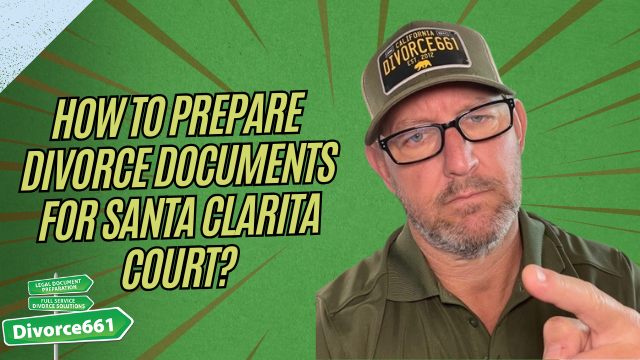How to Prepare Divorce Documents for Santa Clarita Court?
If you are filing for divorce in Santa Clarita, getting your paperwork right is one of the most important steps. The paperwork is what drives your entire case. If forms are incomplete or filed incorrectly, your divorce can be delayed or rejected. This guide walks through the forms you need, how to file them, service requirements, financial disclosures, common mistakes, and a checklist to help you get it done correctly the first time.
Essential Forms to Open Your Case
To start a divorce case in Santa Clarita you must complete and file the initial court forms. At minimum, this includes:
- Petition for Dissolution – the document that asks the court to end the marriage and states the relief you are requesting.
- Summons – notifies your spouse that a divorce case has been filed against them.
- UCCJEA (Uniform Child Custody Jurisdiction and Enforcement Act) – required if you have children. This form provides the court with information about the children and other states involved in custody matters.
These forms must be filed through the Los Angeles County Court electronic filing system. Santa Clarita divorce cases are processed at the Chatsworth Courthouse within the LA County court system, so make sure e-filing is completed properly to open your case.
Serving Your Spouse and Proof of Service
After you file, the next required step is to properly serve your spouse with the filed documents. Service must follow California rules and be completed by someone other than you who is over 18, unless the court orders another method. Common methods include personal service or substituted service with proper follow up.
Once served, you must file a Proof of Service form with the court. This document confirms how, when, and by whom the papers were served. Without a valid Proof of Service, the court will not proceed.
Financial Disclosures: Mandatory and Critical
In every California divorce the parties must exchange financial disclosures. These documents give the court and both parties the information needed to divide assets, determine support, and reach a final judgment. The key disclosures include:
- Schedule of Assets and Debts – lists community and separate property, bank accounts, retirement, real property, debts, and other financial interests.
- Income and Expense Declaration – details current income, expenses, and monthly budget for support calculations and fairness in settlement.
Both parties must complete and exchange these disclosures. Incomplete or missing financial disclosures are a common reason courts reject judgments or delay approvals.
Common Pitfalls and a Real Case Example
Missing forms, unclear settlement terms, and incomplete disclosures are the most frequent reasons for court rejections. Here is a real example that illustrates these risks:
The court rejected their judgment three times due to missing forms and unclear settlement terms.
A Santa Clarita couple tried to prepare and file their judgment on their own. The court rejected the paperwork three separate times because forms were missing and the settlement language was not clear. We reviewed their file, corrected the missing documents, clarified the settlement terms, and resubmitted. The corrected paperwork was approved in just one week.
The lesson is clear. Complete forms, precise settlement terms, and full financial disclosures matter. They speed approval and prevent needless delays.
Step by Step Filing Checklist
- Complete the Petition and Summons.
- If you have children, fill out the UCCJEA form.
- File all initial forms through the Los Angeles County e-filing system.
- Serve your spouse properly and file the Proof of Service.
- Prepare and exchange financial disclosures: Schedule of Assets and Debts and Income and Expense Declaration.
- Review settlement terms for clarity and completeness before submitting judgment documents.
Get It Right the First Time
Preparing complete, court-accepted divorce paperwork avoids rejections and costly delays. If you prefer professional help, there are services that specialize in preparing divorce documents to meet court requirements, offer flat-fee pricing, operate remotely, and deliver court-approved paperwork so your case gets approved the first time.
If you want help preparing your divorce documents correctly for the Santa Clarita court, consider scheduling a consultation with a qualified provider who knows the Los Angeles County e-filing procedures and local courthouse requirements.

